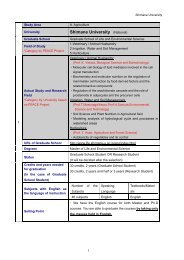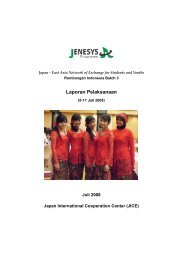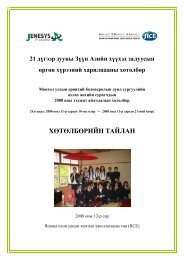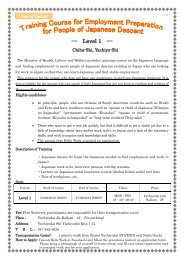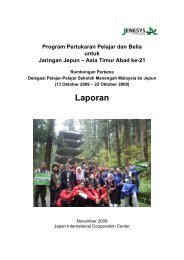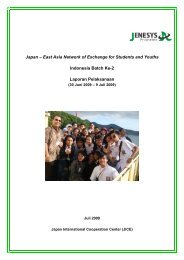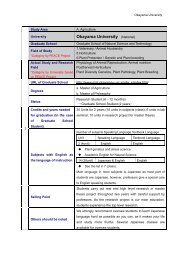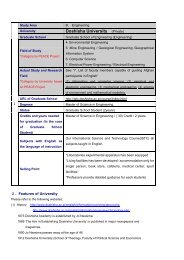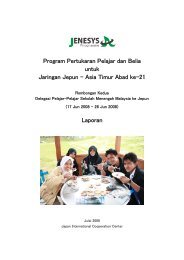Brochure
Brochure
Brochure
- No tags were found...
You also want an ePaper? Increase the reach of your titles
YUMPU automatically turns print PDFs into web optimized ePapers that Google loves.
9CurriculumTo complete these degrees, students take both requiredand elective coursework and write, then defend a thesis.CourseworkBoth degree concentrations start with a series ofchallenging courses in mathematics, statistics, andmicro/macro economics in the Fall and WinterTerms. The International Development program thenemphasizes econometrics and development economicsbefore moving the students toward their preferred areasof emphasis. Beginning in the Spring of their first year,and continuing through their second year of study, thestudents can choose from a wide range of electives suchas Environmental Economics, Development Finance,Cross-Sectional and Panel Analysis, Quantitative Methodsfor Decision Making, etc. Several regional courses givethe program regional tastes or flavors which are alsoimportant in considering socioeconomic development indifferent cultures.The MA in Economics, after the initial pre-requisitecourses, turns to areas such as Public Finance, MonetaryEconomics and Policy Analysis, International Finance, etc.Students may then choose from such electives as Moneyand Banking, Public Finance and Budgeting and manymore. Students in both degree tracks are encouragedto take courses not only from the IDP, but also the IRP,PMPP and the MBA as well.ThesisAs an essential part of both degree tracks, studentswrite a faculty-supervised thesis in line with their careerobjectives, and in support of the objectives of their hostinstitutions (for those sponsored by organizations).Conceptualizing the topic, defining the boundaries,offering their expertise to the topic, then defendingtheir thesis provides an excellent training groundfor future policy and project conceptualization andimplementation. Independent and critical thinking isrequired in the process.International Development Program MA in International Development MA in Economics (including the MPP track)MA in InternationalDevelopmentRequired Courses – Core RequiredCourses (18credits)• Microeconomics I, II• Macroeconomics I,II• Mathematics for Economics and Management (A)• Statistics for Economics and Management• Applied Econometrics• Research Methodology• Development EconomicsRequired Courses - AdvancedSeminar (6 credits)Advanced Seminar I, II, III for ThesisElective Required Courses - AppliedDisciplinary Courses (12 credits)• Agricultural Economics• Applied Time Series Analysis• Computable General Equilibrium Modeling• Corporate Finance• Cost Benefit Analysis• Cross-Sectional and Panel Analysis• Development Finance• Development PlanningMultisector Models• Economic Geography• Environmental Economics• Environmental Policy• Financial Accounting and Reporting• Financial Economics and Capital Markets• Financial Market Policy• Health Economics• Health Policy• Industrial Organization and Public Policy• Inequality and Poverty: Measurementand Applications• International Finance• International Trade• Investments and Asset Pricing• Macroeconomics and Policy Analysis• Money and Banking• Monetary Economics and Policy Analysis• Project Cycle Management• Public Administration• Public Finance• Public Finance and Budgeting• Public Management• Public Policy Process• Public Sector Economics• Quantitative Methods for Decision Making• Time Series Analysis• Urban and Regional PlanningElective Required Courses -Regional and Country Courses(4 credits)• Development of Japanese Industry and Business• Japanese Banking and Financial Systems• Japanese Energy Policy and Regulations• Japanese Public Finance and Administration• Postwar Japanese Economy• Regional Governance and PoliticalEconomy in the Middle East• Trade, Development and the Asia-Pacific EconomyMA inEconomicsRequired Courses – Core RequiredCourses(14 credits)• Microeconomics I, II• Macroeconomics I,II• Mathematics for Economics and Management (A)• Statistics for Economics and Management• Applied EconometricsRequired Courses - AdvancedSeminar (6 credits)Advanced Seminar I, II, III for ThesisElective Required Courses(14 credits)• Agricultural Economics• Applied Game Theory• Applied Time Series Analysis• Computable General Equilibrium Modeling• Corporate Finance• Cost Benefit Analysis• Cross-Sectional and Panel Analysis• Development Economics• Development Finance• Development Planning• Economic Geography• Environmental Economics• Financial Accounting and Reporting• Financial Economics and Capital Markets*• Financial Market Policy• Health Economics• Industrial Organization and Public Policy• Inequality and Poverty: Measurementand Applications• International Finance*• International Trade*• Investment and Asset Pricing• Japanese Banking and Financial Systems• Macroeconomics and Policy Analysis• Monetary Economics and Policy Analysis*• Money and Banking• Personnel Economics for Managers• Public Finance*• Public Finance and Budgeting• Public Sector Economics• Quantitative Methods for Decision Making• Research Methodology• Time Series Analysis* Macroeconomic Policy Program(MPP) requires students to takethese 5 courses as Core Requiredcourses. The requirements of MPPare 24 Required Course credits,6 Advanced Seminar credits,minimum 4 Elective RequiredCcourse credits, and minimum 10Elective Course credits.Electives (4 credits)Select from among most coursesoffered in GSIR and GSIM inconsultation with faculty.Total number of required credits44 creditsElectives (10 credits)Select from among most coursesoffered in GSIR and GSIM inconsultation with faculty.Total number of required credits44 credits* English language courses and Japanese language courses are included in the Electives,but they are not counted into the total number of required credits.



